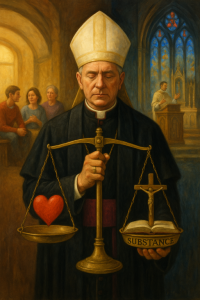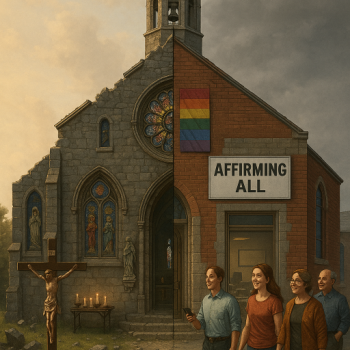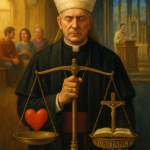
In my last article, I hypothesized about the future of the Catholic Church if progressive Catholics got their way, unhindered. One reader claimed my hypotheticals ventured too far (or totally) into the realm of imagination. Not only that, but my “what ifs” reflected a moral failure on my part for falsely representing progressive Catholicism. What were my hypotheticals? I contended that a Catholic Church in the hands of progressives:
- Values sentiment over substance.
- Makes each person their own magisterium.
- Reimagines the human person.
- Confirms the world instead of converting it.
- Cannot distinguish itself from the Episcopal Church.
In moving forward, I decided to tackle each hypothetical “what if” one at a time and show my “receipts.”
For this article, I address the first “what if” of valuing sentiment over substance. I reference writings from the National Catholic Reporter and America Magazine, and the recently released Synod of Synodality document, Pathways for the Implementation Phase of the Synod. These examples clearly show that valuing sentiment over substance results in:
- A focus on subjective “lived experience.”
- Deemphasizing concepts of sin, judgment, and sacrifice.
- Emphasizing a therapeutic spirituality centered on comfort, not conversion.
- Appeals to “pastoral sensitivity” that affirm disordered sexual preferences and lifestyles.
A Focus on Subjective “Lived Experience”
Anyone familiar with the ongoing Synod of Synodality knows that it focuses on incorporating the “lived experiences” of Catholics. In 2023, Daryl Grinsby of the National Catholic Reporter observed:
Synodality confirms our collective vocation as journeying together, along the ‘way’ to God’s presence… through listening to one another in order to hear what God is saying to all of us.
Likewise, Fr. James Martin, SJ, observed this in 2024 about his personal experience at the synod:
Everyone had the chance to have their say… The fundamental insight of the synod was not only that attentive listening was helpful in decision-making, but also that the Holy Spirit was at work in everyone, not simply in cardinals and bishops.
Finally, the aforementioned Pathways for the Implementation Phase of the Synod confirms that:
Growing as a synodal Church requires knowledge that can only be gained through experience, and it introduces us to an encounter with the Lord. (page 8)
Furthermore, the document contains thirty-six instances of the word experience, twenty-three instances of the word listening, and twenty-four instances of the word dialogue. However, it contains zero instances of the words fidelity, truth, doctrine, or dogma. It seems the synodal pathways do not include paths concerned with fidelity, truth, doctrine, or dogma.
Deemphasizing Concepts of Sin, Judgment, and Sacrifice
The document uses the word “conversion” fourteen times—but never in relation to sin or repentance. “Sin,” “hell,” and “judgment” fail to make an appearance. Instead, the document focuses on emotional resonance:
We are… a Church ever open to welcoming… all those who are in need of our charity, our presence, our readiness to dialogue and our love. (p. 2)
The sentiment reflects much of what we read from progressive publications like America Magazine and National Catholic Reporter. For example:
Judgmentalism is the worst sin in the Christian life, and his goal is “to make … L.G.B.T. people feel equally welcome in the life of the church as everyone else.” (Cardinal McElroy: Sex and sin need a new framework in the church, February 2023)
And:
Christ never withholds food to impose obedience; rather, he sets his table among the sinners and gains their hearts by pouring out his own body and blood. Submission to him comes from his submission in love to us. His teaching comes in word and act, in the healing of the leper and the calling of the tax collector. Jesus never comes with a threat, never teaches by withholding his presence, even to the spending of his life. (I don’t think we should be banning anyone from the Eucharist, May 2022)
In the Cardinal McElroy interview, sin and judgment are portrayed as more harmful than wrongdoing itself. The call for inclusion overshadows any call to repentance or doctrinal understanding—showing clear evidence of a pastoral retelling that avoids moral challenge. Moreover, the Eucharist piece reframes the Eucharist as emotional support, not as a means of sanctification or moral accountability. It presents withholding the Eucharist as unloving and not WWJD.
Emphasizing a Therapeutic Spirituality Centered on Comfort, Not Conversion
Without concrete changes, the vision of a synodal Church will not gain credibility. (p. 19)
The synodal document acknowledges needed change but frames it entirely in terms of structures, participation, and feelings of inclusion.
The FD proposes to the whole Church… a journey of conversion… likely to lead to changes in behavior and lifestyles. (p. 17)
What kind of conversion? Not conversion to Christ through repentance, but conversion to a synodal culture of participation and dialogue. This reflects a therapeutic anthropology: the Church helps people feel better, not become holy.
Again, such sentiment often appears in progressive theological reflections. Fr. Thomas Reese, writing for the National Catholic Reporter in December 2023, states that comfort, not holy fear, must motivate Christian lives:
…the church should be like a field hospital. Each of us has our own wounds, our own sins, our own disappointments, and we need to hear words of comfort from God… We do that by imitating God, by imitating Jesus, by comforting his people, by binding up wounds, by healing each other’s injuries, by righting wrongs with mercy and justice.
Words of conversion often cause discomfort, and discomfort is often anathema to those who preach a therapeutic Christ.
Appeals to “Pastoral Sensitivity” That Affirm Disordered Sexual Preferences and Lifestyles
The synodal document does not explicitly reference “pastoral sensitivity” as it relates to disordered sexual preferences and lifestyles. However, it does use language that other synodal documents (particularly, the Continental Stage Document [Documento-Tappa-Continentale, DCS]) use when doing so. For example, Pathways for the Implementation Phase of the Synod references people “made poor” and “those excluded” and how the Church “cannot lose the contribution of their point of view.” (p. 9) The DCS document makes clear the identity of these “excluded” in paragraph 39. It states:
Among those who ask for a more meaningful dialogue and a more welcoming space, we also find those who, for various reasons, feel a tension between belonging to the Church and their own loving relationships, such as: remarried divorcees, single parents, people living in a polygamous marriage, LGBTQ people, etc… This is a problematic challenge for the Church because these people feel excluded” (EC Lesotho).
Also absent in the DCS are any mentions of repentance, conversion (in the moral or spiritual sense), moral formation, sin, judgment, or holiness (as a spiritual or moral goal). The document reflects a pastoral sensitivity and relational approach that avoids confronting disordered behaviors or calling for repentance—an omission that risks affirming lifestyles inconsistent with Catholic moral teaching.
Final Thoughts…
The shift towards valuing sentiment over substance in some progressive circles within the Church presents a serious challenge to Catholic teaching. By prioritizing personal experience and emotional comfort over doctrine, we risk losing the very essence of the Church’s mission: to lead souls to Christ through truth, repentance, and holiness. Moreover, when terms like “sin” and “conversion” are omitted, the Church becomes a place of affirmation rather than transformation.
So, as mentioned in the introduction, this hypothetical “what if” is not some outlandish figment of my imagination. I’ve brought the “receipts” to prove it.
As Catholics, we must decide: Do we want a Church that mirrors the world, or one that stands firm in its teachings and calls all to holiness? The choice is clear—faithfulness to truth is essential if we are to truly convert hearts and souls in Christ’s name.
Thank you!
If you liked this article, please leave your comments below. I am very interested in your opinion on this topic.
Read The Latin Right’s other writing here.
Please visit my Facebook page and IM your questions (and follow my page) or topics for articles you would like covered.












